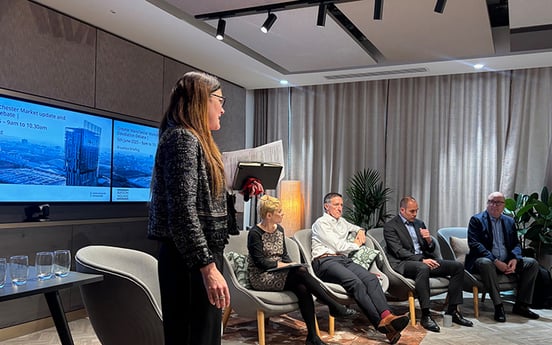From vision to delivery: Greater Manchester, devolution and driving regional growth

Greater Manchester has led the way in the devolution agenda, often looked to as a blueprint for how city regions can gain more control over local and regional decision-making. Its pioneering devolution deal in 2014 marked a significant shift, enabling the city region to tailor services more closely to the needs of its residents.
Since then, Greater Manchester has continued to build on this foundation, demonstrating how local leadership, combined with integrated public services and a strategic vision, can drive inclusive growth and improve outcomes for communities.
How a decade of devolution has shaped the region
Last week, Avison Young hosted a timely panel event in Manchester, bringing together public and private sector leaders to reflect on the city region’s devolution journey to date, and what needs to happen next to unlock long-term growth. The discussion explored Greater Manchester’s role as a national trailblazer, its challenges and opportunities, and the priorities that should shape the next chapter.
Speakers – including John Tatham, Andrew McIntosh and Vickey Neiscier – reflected on the real political stability the region has enjoyed, backed by local vision.
That stability and vision, however, have not always been accompanied by certainty. While Greater Manchester has consistently shown ambition and strategic intent, its progress has sometimes depended on shifting national policy.
Still, its role in helping Whitehall understand the potential of devolution has been significant. Greater Manchester has played a pivotal role in shaping national thinking on what a devolved model can and should look like.
Extending the benefits across the region
The panel compared Manchester’s trajectory to that of other UK city regions such as Bristol, Birmingham and Leeds. While these cities are growing in confidence, Manchester retains a distinct edge.
In the eyes of international investors, London and Manchester are currently viewed as the safest destinations for capital. This reputation is underpinned by strong city branding, global sporting appeal, and resilient local economies. Supporting this strength is the region’s concentration of world-class universities, a skilled workforce and a well-educated population.
However, energy and optimism in the urban core aren’t always mirrored across the wider city region. There is a pressing need to address inequalities across boroughs and city fringes to ensure the benefits of devolution are more evenly felt. From housing shortages to limited infrastructure and uneven access to employment opportunities, the devolution agenda must now prioritise a region-wide approach.
This means targeted investment in housing, transport and employment spaces. More office space is needed. The timing is pertinent – new government funding to the tune of £39bn over the next decade for affordable housing, along with an additional £10bn for financial investments to be delivered via Homes England, has just been announced.
This represents a real step change in political thinking and could help unlock hundreds of thousands of new homes and accelerate progress toward housing goals across Greater Manchester. The success of devolution will ultimately rest on how well it can serve the full breadth of the city region’s growing population.
Long-term investment, not short-term wins
A major theme was the need to create an investment environment that supports long-term thinking. Viability remains a challenge, particularly in housing – yet affordable housing should now be viewed not as a cost centre but as a critical enabler of inclusive growth.
The panel explored the balance between grant funding and private capital, emphasising that speculative investment isn’t enough. Crucially, the region needs funding models that allow money to be recycled — flowing back into the public sector and reinvested for long-term development.
Recent government plans to raise research and development funding to £22bn a year by the end of the spending period reinforce the role of innovation and technology in regional growth.
Encouragingly, the integrated settlement Greater Manchester has secured is helping to stabilise the landscape. With a larger pot of recyclable funding from central government, the combined authority can now plan for the longer term and work with local authorities to agree shared priorities. This introduces much-needed efficiency and enables coordinated action that delivers lasting outcomes.
A blueprint, applied with care
The conversation turned to what other city regions can learn from Greater Manchester’s experience. Collaboration between local authorities was seen as central to the model’s success. When progress in one part of a region spills into others, the benefits multiply.
While Greater Manchester and other early adopters have laid down a blueprint, that doesn’t mean new combined authorities should simply replicate it. There’s a need for common architecture across UK devolution – one that supports consistency but also allows for local context. New approaches shouldn’t be built from scratch every time, but nor should every region be treated as an isolated case. A middle ground is needed.
Another key factor was the separation between politics and delivery. Greater Manchester has benefited from political consensus on its vision, allowing delivery teams to operate with clarity. When politicians focus on setting direction – not micromanaging execution – progress accelerates and uncertainty is reduced.
By the region, for the region
As Greater Manchester enters its next phase of devolution, the focus is clear: maintain the momentum, widen the benefits and reward long-term commitment. From housing and infrastructure to investment models and funding settlements, the event reinforced that the city region is on a purposeful path – but the journey isn’t finished.
One visible sign of progress is Manchester City Council’s acquisition of land near Ancoats, where it plans to transform the former Toys R Us site into the Manchester Digital Campus – a new office complex expected to house 7,000 civil servants. This builds on Greater Manchester’s growing role as a base for digital and tech-based civil service jobs, including the GCHQ presence at Albert Square and second HQs for the Departments for Science, Innovation and Technology and Culture, Media and Sport.
At Avison Young, we’re proud to convene these conversations and play our part in shaping places that work for people. As Greater Manchester continues its devolution journey, we remain committed to supporting long-term, inclusive growth across the region.

